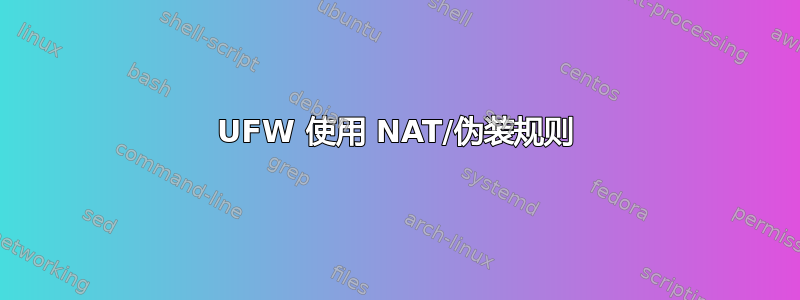
我正在尝试将 Ubuntu 用作某种路由器,通过限制我的私人网络上的计算机在互联网上可以连接的内容。
Ubuntu 盒子有两个 NIC,一个面向互联网(enp0s3),一个面向这台私人 PC(enp0s8)。
首先,我想看看是否可以通过 Ubuntu 允许来自私人盒子的 DNS。我按照一些说明添加了一些“路由允许”规则,例如它导致:
ufw status verbose
Status: active
Logging: on (low)
Default: deny (incoming), deny (outgoing), allow (routed)
New profiles: skip
To Action From
-- ------ ----
8.8.8.8 on enp0s3 ALLOW FWD Anywhere on enp0s8
8.8.4.4 on enp0s3 ALLOW FWD Anywhere on enp0s8
10.0.1.5 on enp0s8 ALLOW FWD Anywhere on enp0s3
10.0.1.5 是我的私人电脑。使用 Wireshark 我可以看到 enp0s3 和 enp0s8 上都有 DNS 请求,但 enp0s3 上的请求没有回复。
因此,在阅读了更多内容之后,我发现我需要设置 NAT 和伪装,因此我将以下内容放入 rules.before 中:
# NAT table rules
*nat
:POSTROUTING ACCEPT [0:0]
# Forward traffic through eth0 - Change to match you out-interface
-A POSTROUTING -s 10.0.1.0/24 -o enp0s3 -j MASQUERADE
# don't delete the 'COMMIT' line or these nat table rules won't
# be processed
COMMIT
这招奏效了,但效果太好了。现在所有流量都传出并返回到我的私人电脑,默认的拒绝传出和其他 UFW 规则似乎都被绕过了。
所以我的问题很简单 - 我希望私人 PC 通过 Ubuntu 获得连接,例如提供的 NAT,但带有传出限制,因为我以为我最初使用 ufw 命令行配置了该限制。有没有办法在 NAT 完成后以某种方式应用 UFW 规则?
短暂性脑缺血。
这是完整的 before.rules 文件。我唯一的更改是 NAT 表规则:
#
# rules.before
#
# Rules that should be run before the ufw command line added rules. Custom
# rules should be added to one of these chains:
# ufw-before-input
# ufw-before-output
# ufw-before-forward
#
# NAT table rules
*nat
:POSTROUTING ACCEPT [0:0]
# Forward traffic through eth0 - Change to match you out-interface
-A POSTROUTING -s 10.0.1.0/24 -o enp0s3 -j MASQUERADE
# don't delete the 'COMMIT' line or these nat table rules won't
# be processed
COMMIT
# Don't delete these required lines, otherwise there will be errors
*filter
:ufw-before-input - [0:0]
:ufw-before-output - [0:0]
:ufw-before-forward - [0:0]
:ufw-not-local - [0:0]
# End required lines
# allow all on loopback
-A ufw-before-input -i lo -j ACCEPT
-A ufw-before-output -o lo -j ACCEPT
# quickly process packets for which we already have a connection
-A ufw-before-input -m conntrack --ctstate RELATED,ESTABLISHED -j ACCEPT
-A ufw-before-output -m conntrack --ctstate RELATED,ESTABLISHED -j ACCEPT
-A ufw-before-forward -m conntrack --ctstate RELATED,ESTABLISHED -j ACCEPT
# drop INVALID packets (logs these in loglevel medium and higher)
-A ufw-before-input -m conntrack --ctstate INVALID -j ufw-logging-deny
-A ufw-before-input -m conntrack --ctstate INVALID -j DROP
# ok icmp codes for INPUT
-A ufw-before-input -p icmp --icmp-type destination-unreachable -j ACCEPT
-A ufw-before-input -p icmp --icmp-type time-exceeded -j ACCEPT
-A ufw-before-input -p icmp --icmp-type parameter-problem -j ACCEPT
-A ufw-before-input -p icmp --icmp-type echo-request -j ACCEPT
# ok icmp code for FORWARD
-A ufw-before-forward -p icmp --icmp-type destination-unreachable -j ACCEPT
-A ufw-before-forward -p icmp --icmp-type time-exceeded -j ACCEPT
-A ufw-before-forward -p icmp --icmp-type parameter-problem -j ACCEPT
-A ufw-before-forward -p icmp --icmp-type echo-request -j ACCEPT
# allow dhcp client to work
-A ufw-before-input -p udp --sport 67 --dport 68 -j ACCEPT
#
# ufw-not-local
#
-A ufw-before-input -j ufw-not-local
# if LOCAL, RETURN
-A ufw-not-local -m addrtype --dst-type LOCAL -j RETURN
# if MULTICAST, RETURN
-A ufw-not-local -m addrtype --dst-type MULTICAST -j RETURN
# if BROADCAST, RETURN
-A ufw-not-local -m addrtype --dst-type BROADCAST -j RETURN
# all other non-local packets are dropped
-A ufw-not-local -m limit --limit 3/min --limit-burst 10 -j ufw-logging-deny
-A ufw-not-local -j DROP
# allow MULTICAST mDNS for service discovery (be sure the MULTICAST line above
# is uncommented)
-A ufw-before-input -p udp -d 224.0.0.251 --dport 5353 -j ACCEPT
# allow MULTICAST UPnP for service discovery (be sure the MULTICAST line above
# is uncommented)
-A ufw-before-input -p udp -d 239.255.255.250 --dport 1900 -j ACCEPT
# don't delete the 'COMMIT' line or these rules won't be processed
COMMIT
答案1
路由/转发规则似乎完全独立到正常的防火墙规则。我将 NAT 内容移至 after.rules,并将“路由”流量的默认规则更改为“拒绝”。似乎发生了 POSTROUTING后默认拒绝规则已应用 - 因此如果默认规则拒绝了某项内容,则不会通过 nat 路由将其路由出去。当然可以添加用户规则(例如“ufw route allow ...”),它们可以在应用默认拒绝之前允许流量,然后按预期路由出去。


